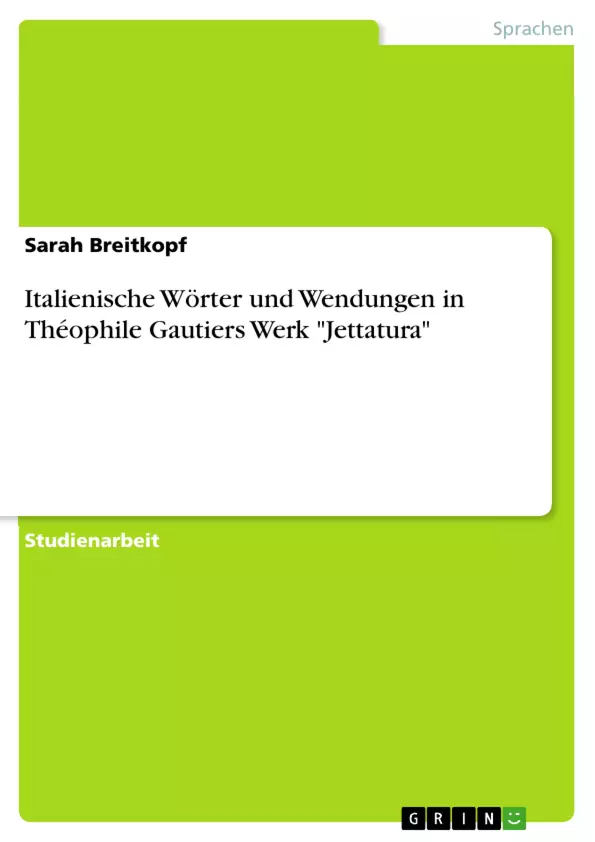In unzähligen literarischen Werken kann man feststellen, dass einige Worte aus anderen Sprachen in den Text aufgenommen wurden. Oft geschah dies aufgrund der Vorherrschaft einer Nation, die zu einem Einfluss in verschiedensten Gebieten andere Nationen führte. In anderen Fällen, kann Grund für die Aufnahme von Wörtern einer bestimmten Sprache, deren Beliebtheit zu einer bestimmten Epoche sein.
Théophile Gautier verwendet in seinem Werk „Jettatura“ zahlreiche italienische Wörter, die er genauso gut in seiner Muttersprache, nämlich dem Französischen hätte ausdrücken können. Nun stellt sich schließlich die Frage, warum er dies tut.
In der folgenden Arbeit sollen die Verwendung italienischer Wörter und Wendungen in Gautiers Erzählung „Jettatura“ im Mittelpunkt stehen. Hierbei soll als Erstes der Grund für die Auswahl von Neapel als Schauplatz dieser phantastischen Erzählung genannt werden.
Danach wird im Allgemeinen auf Erklärungen italienischer Wörter eingegangen. Im Vordergrund werden hierbei zunächst die Begriffe „Jettatura“ und „Forestier“ stehen. Daraufhin werden Gründe für das Vorkommen der italienischen Sprache in der „Jettatura“ veranschaulicht und kontextorientierte Deutungen italienischer im Alltag verwendeter Worte folgen.
Hiernach wird zur Symbolik zweier Familien- und einem Personennamen übergegangen werden.
Abschließend soll eine Interpretation des im Roman vorkommenden Zitats „Vedi Napoli e poi mori“ folgen.
Der Arbeit liegt der Originaltext von Théophile Gautiers „Jettatura“ zugrunde. An einigen Stellen greife ich jedoch auf die Übersetzung ins Deutsche von Alastair zurück.
Inhaltsverzeichnis
- Einleitung
- Ansiedlung der Handlung in Neapel
- Begriffserklärungen
- ,,Jettatura"
- ,,Forestier"
- Vermittlung einer italienischen Atmosphäre
- Geographische Bezeichnungen
- Italienische Anreden und Namen
- Italienische Personenbezeichnungen
- Italienische Wörter aus dem Alltag
- Symbolik von Personennamen
- Paul d'Aspremont
- Don Felipe Altavilla
- Vicè
- Symbolik der „Rue de la Fortune“
- ,,Vedi Napoli e poi mori“
Zielsetzung und Themenschwerpunkte
Diese Arbeit untersucht die Verwendung italienischer Wörter und Wendungen in Théophile Gautiers Erzählung „Jettatura“. Sie analysiert die Gründe für die Wahl Neapels als Schauplatz, erklärt die Bedeutung italienischer Begriffe im Kontext der Erzählung und beleuchtet die Symbolik von Personennamen und dem Zitat „Vedi Napoli e poi mori“.
- Die Bedeutung von Neapel als Schauplatz für die Handlung
- Die Verwendung italienischer Wörter und Wendungen im Roman
- Die Symbolik von Personennamen und der Bedeutung von „Jettatura“
- Die Rolle des Aberglaubens in der italienischen Gesellschaft des 19. Jahrhunderts
- Die Interpretation des Zitats „Vedi Napoli e poi mori“
Zusammenfassung der Kapitel
Die Einleitung führt in die Thematik der Verwendung fremder Sprachen in literarischen Werken ein und stellt die Forschungsfrage nach der Bedeutung italienischer Wörter in Gautiers „Jettatura“.
Das zweite Kapitel erläutert die Wahl Neapels als Schauplatz der Erzählung, indem es die Rolle des Aberglaubens in der italienischen Gesellschaft des 19. Jahrhunderts beleuchtet und die „Jettatura“ als ein Phänomen des neapolitanischen Alltags einordnet.
Im dritten Kapitel werden die Begriffe „Jettatura“ und „Forestier“ erklärt und ihre Bedeutung im Kontext der Erzählung beleuchtet.
Das vierte Kapitel analysiert die Vermittlung einer italienischen Atmosphäre durch geographische Bezeichnungen, Anreden, Namen und Alltagssprache.
Das fünfte Kapitel widmet sich der Symbolik der Personennamen Paul d'Aspremont, Don Felipe Altavilla und Vicè.
Das sechste Kapitel untersucht die Symbolik der „Rue de la Fortune“.
Das siebte Kapitel interpretiert das Zitat „Vedi Napoli e poi mori“.
Schlüsselwörter
„Jettatura“, Neapel, Aberglaube, italienische Sprache, Symbolik, Personennamen, „Vedi Napoli e poi mori“, Théophile Gautier, Phantastische Erzählungen.
Häufig gestellte Fragen
Warum spielt Gautiers Erzählung „Jettatura“ in Neapel?
Neapel wurde aufgrund des dort tief verwurzelten Aberglaubens und des Phänomens des „bösen Blicks“ (Jettatura) als idealer Schauplatz gewählt.
Was bedeutet der Begriff „Jettatura“?
Der Begriff bezeichnet im neapolitanischen Volksglauben den „bösen Blick“, der Unglück oder Unheil über andere bringen kann.
Warum verwendet Gautier italienische Wörter im französischen Text?
Die italienischen Begriffe dienen dazu, eine authentische Atmosphäre zu vermitteln und den lokalen Kontext der Handlung zu unterstreichen.
Welche Symbolik steckt hinter dem Namen Paul d'Aspremont?
Der Name deutet auf einen „rauen Berg“ hin und symbolisiert die schroffe, unheilvolle Natur des Protagonisten, der als Jettatore gilt.
Was bedeutet das Zitat „Vedi Napoli e poi mori“?
Es bedeutet „Neapel sehen und dann sterben“ und wird in der Arbeit im Hinblick auf die schicksalhafte Handlung des Romans interpretiert.
- Quote paper
- Sarah Breitkopf (Author), 2005, Italienische Wörter und Wendungen in Théophile Gautiers Werk "Jettatura" , Munich, GRIN Verlag, https://www.grin.com/document/116439



